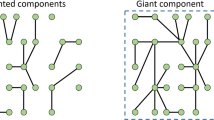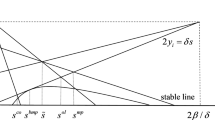Abstract
This paper investigates the algebraic formulation and control for a class of networked evolutionary games with finite memories and time-varying networks by using the semi-tensor product method and presents a number of new results. Firstly, a kind of algebraic expressions is formulated for the given networked evolutionary games, and the dynamics of the given game is expressed as a finite homogenous Markov chain, based on which, the behaviors of the players in the corresponding evolutionary games are analyzed. Then, the control problem of the given games is studied. Under certain assumptions, the relationship between the strict Nash equilibriums and the fixed points of the given networked evolutionary games is revealed, and a free-type control sequence is designed to guarantee the Nash equilibrium reachable globally. Finally, an illustrative example is studied to support our new results.

Similar content being viewed by others
References
C. Adami, A. Hintze, Evolutionary instability of zero-determinant strategies demonstrates that winning is not everything. Nat. Commun. 4, 2193 (2013)
M. Bell, S. Perera, M. Piraveenan, M. Bliemer, T. Latty, C. Reid, Network growth models: a behavioural basis for attachment proportional to fitness. Sci. Rep. 7, 42431 (2017)
D. Cheng, H. Qi, Z. Li, Analysis and Control of Boolean Networks: A Semi-tensor Product Approach (Springer, London, 2011)
D. Cheng, F. He, H. Qi, T. Xu, Modeling, analysis and control of networked evolutionary games. IEEE Trans. Automat. Contr. 60(9), 2402–2415 (2015)
D. Cheng, On finite potential games. Automatica 50(7), 1793–1801 (2014)
D. Cheng, T. Xu, H. Qi, Evolutionarily stable strategy of networked evolutionary games. IEEE Trans. Neural Netw. Learn. Syst. 25(7), 1335–1345 (2014)
D. Friedman, On economic applications of evolutionary game theory. J. Evol. Econ. 8(1), 15–43 (1998)
S. Fu, Y. Wang, G. Zhao, A matrix approach to the analysis and control of networked evolutionary games with bankruptcy mechanism. Asian J. Control 19(2), 717–727 (2017)
D. Fudenberg, D.K. Levine, The Theory of Learning in Games (MIT Press, Cambridge, 1998)
R. Gibbons, A Primer in Game Theory (Harvester Wheatsheaf, New York, 1992)
P. Guo, Y. Wang, H. Li, Algebraic formulation and strategy optimization for a class of evolutionary network games via semi-tensor product method. Automatica 49(11), 3384–3389 (2013)
P. Guo, H. Zhang, F.E. Alsaadi, T. Hayat, Semi-tensor product method to a class of event-triggered control for finite evolutionary networked games. IET Control Theory Appl. 11(13), 2140–2145 (2017)
C. Jiang, Y. Chen, K.R. Liu, Graphical evolutionary game for information diffusion over social networks. IEEE J. Sel. Top. Signal Process. 8(4), 524–536 (2014)
S. Kalpazidou, Cycloid decompositions of finite Markov chains. Circuits Syst. Signal Process. 18(3), 191–204 (1999)
D. Kasthurirathna, H. Nguyen, M. Piraveenan, S. Uddin, U. Senanayake, Optimisation of strategy placements for public good in complex networks, in Proceedings of the 2014 International Conference on Social Computing, (2014), pp. 1–8
D. Kasthurirathna, M. Piraveenan, Emergence of scale-free characteristics in socio-ecological systems with bounded rationality. Sci. Rep. 5, 10448 (2015)
J. Kemeny, J. Snell, Finite Markov Chains (van Nostrand, Princeton, 1960)
F. Li, J. Sun, Controllability of higher order Boolean control networks. Appl. Math. Comput. 219(1), 158–169 (2012)
H. Li, Y. Wang, L. Xie, Output tracking control of Boolean control networks via state feedback: constant reference signal case. Automatica 59, 54–59 (2015)
H. Li, Y. Wang, Output tracking of switched Boolean networks under open-loop/closed-loop switching signals. Nonlinear Anal. Hybrid Syst. 22, 137–146 (2016)
H. Li, L. Xie, Y. Wang, On robust control invariance of Boolean control networks. Automatica 68, 392–396 (2016)
H. Li, Y. Wang, Controllability analysis and control design for switched Boolean networks with state and input constraints. SIAM J. Control Optim. 53(5), 2955–2979 (2015)
H. Li, L. Xie, Y. Wang, Output regulation of Boolean control networks. IEEE Trans. Automat. Contr. 62(6), 2993–2998 (2017)
H. Li, X. Ding, A. Alsaedi, F.E. Alsaadi, Stochastic set stabilisation of n-person random evolutionary Boolean games and its applications. IET Control Theory Appl. 11(13), 2152–2160 (2017)
H. Li, G. Zhao, M. Meng, J. Feng, A survey on applications of semi-tensor product method in engineering. Sci. China Inform. Sci. https://doi.org/10.1007/s11432-017-9238-1
J. Lu, H. Li, Y. Liu, F. Li, Survey on semi-tensor product method with its applications in logical networks and other finite-valued systems. IET Control Theory Appl. 11(13), 2040–2047 (2017)
R.D. Luce, H. Raiffa, Games and Decisions: Introduction and Critical Surveys (Wiley, New York, 1957)
M. Meng, B. Li, J. Feng, Controllability and observability of singular Boolean control networks. Circuits Syst. Signal Process. 34(4), 1233–1248 (2015)
M. Meng, J. Lam, J. Feng, X. Li, \(l_1\)-gain analysis and model reduction problem for Boolean control networks. Inform. Sci. 348, 68–83 (2016)
M. Nowak, K. Sigmund, Evolutionary dynamics of biological games. Science 303(5659), 793–799 (2004)
M. Perc, A. Szolnoki, Coevolutionary games–a mini review. BioSystems 99(2), 109–125 (2010)
M. Perc, J. Gomez-Gardenes, A. Szolnoki, L.M. Floria, Y. Moreno, Evolutionary dynamics of group interactions on structured populations: a review. J. R. Soc. Interface 10(80), 20120997 (2013)
M. Perc, Phase transitions in models of human cooperation. Phys. Lett. A 380(36), 2803–2808 (2016)
A. Szolnoki, M. Perc, Resolving social dilemmas on evolving random networks. Europhys. Lett. 86(3), 30007 (2009)
A. Szolnoki, M. Perc, Z. Danku, Making new connections towards cooperation in the prisoner’s dilemma game. Europhys. Lett. 84(5), 50007 (2008)
C. Taylor, D. Fudenberg, A. Sasaki, M. Nowak, Evolutionary game dynamics in finite populations. Bull. Math. Biol. 66(6), 1621–1644 (2004)
Z. Wang, L. Wang, A. Szolnoki, M. Perc, Evolutionary games on multilayer networks: a colloquium. Eur. Phys. J. B (2015). https://doi.org/10.1140/epjb/e2015-60270-7
W. Wang, J. Ren, G. Chen, B. Wang, Memory-based snowdrift game on networks. Phys. Rev. E 74(5), 056113 (2006)
C. Zhang, J. Zhang, G. Xie, L. Wang, M. Perc, Evolution of interactions and cooperation in the spatial prisoner’s dilemma game. PloS One 6(10), e26724 (2011)
G. Zhao, S. Fu, Matrix approach to trajectory control of higher-order k-valued logical control networks. Control Theory Appl. 11(13), 2110–2115 (2017)
G. Zhao, Y. Wang, Formulation and optimization control of a class of networked evolutionary games with switched topologies. Nonlinear Anal. Hybrid Syst. 22, 98–107 (2016)
Y. Zhao, Z. Li, D. Cheng, Optimal control of logical control networks. IEEE Trans. Automat. Contr. 56(8), 1766–1776 (2011)
Acknowledgements
This work is supported by the National Natural Science Foundation of China under Grants 61374065 and 61503225, the Natural Science Fund for Distinguished Young Scholars of Shandong Province under Grant JQ201613 and the Natural Science Foundation of Shandong Province under Grant ZR2015FQ003.
Author information
Authors and Affiliations
Corresponding author
Rights and permissions
About this article
Cite this article
Fu, S., Zhao, G., Li, H. et al. Model and Control for a Class of Networked Evolutionary Games with Finite Memories and Time-Varying Networks. Circuits Syst Signal Process 37, 3093–3114 (2018). https://doi.org/10.1007/s00034-017-0707-2
Received:
Revised:
Accepted:
Published:
Issue Date:
DOI: https://doi.org/10.1007/s00034-017-0707-2




